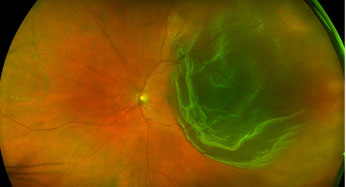Our retina specialists are board-certified ophthalmologists with advanced training in vitreoretinal surgery to diagnose and manage the full spectrum of diseases affecting the retina, macula, and vitreous.
Uveitis
What is Uveitis?
Uveitis is a broad group of disorders that involves inflammation of various parts of the "uveal tract" in the eye, a group of structures important to your vision. Uveitis can be categorized as noninfectious or infectious. Non-infectious causes are much more common, but a series of lab tests may be indicated to ensure that there is not a treatable infection causing the inflammation. Of the non-infectious cases of uveitis, this inflammation can be either an isolated inflammation in the eye, or can be part of a broader systemic disease.
Based on your type of uveitis or inflammation, your eye doctor may perform a work-up for systemic diseases that may include further lab testing, a chest x-ray, and sometimes a chest CT scan. In addition, a diagnostic work-up may involve fluorescein angiography, or an OCT scan of your retina to establish the extent of involvement and monitor a response to treatment.
Treatment for Uveitis
Treatment often includes topical steroid eye drops, but may include steroid injections, or various oral medications designed to modify your immune response in your eye to reduce inflammation. This care may be coordinated with a rheumatologist depending on your treatment plan. Please discuss your specific type of uveitis further with your retina/uveitis specialist for more detailed information.
Online Resources
- Uveitis - The National Eye Institute
- What Is Uveitis? - American Academy of Ophthalmology



